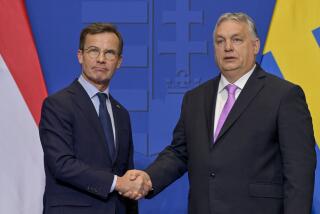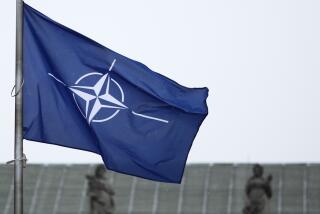NATO : Why Russia May Become Stubborn
SANTA CRUZ, CALIF. — Since the break-up of the U.S.S.R. in late 1991 and the discrediting of its ruling ideology of Marxism-Leninism, Russians have been searching for a set of unifying national values and principles. Their grasping for a common national identity has led to intense and divisive debate within the Russian body-politic. One issue, however, shows signs of uniting Russians across virtually all party lines: the expansion of the North Atlantic Treaty Organization.
With their military establishment in a woeful and decrepit state, Russians are at a loss to understand why NATO is growing. They regard its expansion as a provocation and another sign of Washington’s global hegemonic ambitions.
Despite the relative acquiescence of members of the Yeltsin government to NATO’s “invitations” to Poland, Hungary and the Czech Republic to join the organization, the potential negative consequences of NATO expansion for the still critical U.S.-Russian relationship are manifold. At least four issues can be identified: Russian ratification of the START 2 agreement; budget cuts to the Russian military; Russian sales of weapons and technologies to states that Washington considers rogue or outlaw, and Russian-U.S. cooperation on the control and safeguarding of Russian and CIS nuclear weapons and materials.
Progress on these issues will require solid Russian support, both public and political. Yet, NATO expansion ensures that achieving such a level of support will be anything but routine. Consider:
* START 2, signed in 1993 and ratified by the U.S. Senate in January 1996, calls for deep reductions in strategic nuclear-weapons systems. By the late 1980s, the United States and the Soviet Union each possessed more than 10,000 strategic nuclear warheads. START 2 brings down that number to 3,000-3,500 for each side and accomplishes a goal U.S. strategists have long sought: banning multiple warheads on ICBMSs.
Russian President Boris N. Yeltsin, Defense Minister Igor Sergeyev and others in the Russian defense and foreign-affairs establishment support ratification of START 2. Their support, however, has come under blistering attack from a large number of Duma members who contend that NATO expansion should end any talk of ratification. Such hostility to the agreement casts a pall on the follow-on START 3 negotiations, which would bring warhead totals down even more.
* During the Cold War, the military-industrial complex enjoyed a level of funding, benefits and prestige that current officers and defense professionals can only dream of. In part, the sorry lot of today’s Russian military is caused by the government’s inability to collect taxes and its overall difficulty in getting its financial house in order. Burdened by large budget deficits and austerity measures, Yeltsin is seeking even more cuts in military spending.
While there is little extra money for any type of government spending, most Russian parliamentarians can be expected to resist cutting the military budget yet again, especially with NATO edging closer to Russia. Although the memory of the “Great Patriotic War” is fading, Russians still take pride in their armed forces and in the way they brought co-equal, superpower status to the former Soviet Union. With the perceived threat of NATO growing, reductions in the defense budget are likely to be vigorously resisted as doves’ voices are overwhelmed by calls to cut no more.
* In their regular meetings and conversations, Vice President Al Gore and Prime Minister Viktor S. Chernomyrdin have frequently discussed the sale of Russian arms and technologies to states Washington considers rogue or outlaw. The United States, the world’s No. 1 arms seller, has been particularly disturbed by possible sales of Russian weaponry and technology to Iran and Libya. In one such deal, Russia would help Tehran build nuclear-capable, long-range missiles.
With Russian hard-currency earnings having taken a mighty plunge over the past six years, one of the few sectors in which Russia remains competitive is military hardware. Accordingly, NATO enlargement will likely increase the deafness of the Russian political elite to U.S. entreaties to cut back or stop arms sales to nations out of favor in Washington.
* Not long ago, former Russian Security Minister Alexander I. Lebed asserted that there were close to 100 suitcase-sized nuclear weapons unaccounted for in Moscow’s arsenal. His assertion was quickly challenged by officials in the Russian defense ministry, leaving up in the air the veracity of Lebed’s claim.
What is not subject to much doubt is how the breakdown of Russia’s nuclear establishment and the weakening of its nuclear command-and-control network are of great concern to the West. In fact, over the past several years, Congress has allocated hundreds of millions of dollars to safeguard the Russian nuclear establishment. This money has been spent to try and keep Russian physicists and nuclear technicians from sharing their knowledge with undesirables from unfriendly states and to better protect Russia’s nuclear arsenal.
Given the sometimes anecdotal, sometimes documented reports of trafficking in nuclear materials and hardware in states of the former Soviet Union and along its borders, there seems little question that greater diligence is required to combat what will perhaps be the most serious and urgent security challenge facing the United States in the coming decade. But NATO enlargement may threaten Russia’s willingness to cooperate closely on this issue.
There are growing feelings of suspicion and distrust of the United States, feelings that cut across Russian politics and society. After the reunification of Germany under Western terms, after the disbanding of the Warsaw Pact and departure of half-a-million Russian soldiers from Central and Eastern Europe, and after signing nuclear and conventional arms-reduction treaties that are seen by many as being too generous to the West, Russians see precious little reciprocity coming from the United States. The enlargement of NATO to include former Soviet satellite states brings this all to a boil, as a widespread sense of betrayal jeopardizes cooperation in a number of critical areas of U.S.-Russian relations.
At present, there appears to be no end in sight in the acrimonious struggle over the new Russian national identity. How ironic it would be if a growing antipathy to the United States, as exemplified by the anger over NATO moving ever closer, would serve as that unifying agent.
More to Read
Sign up for Essential California
The most important California stories and recommendations in your inbox every morning.
You may occasionally receive promotional content from the Los Angeles Times.










